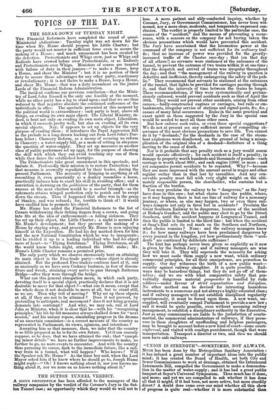THE SUTTON TUNNEL VERDICT.
A LOCUS POKNITEN112E has been afforded to the managers of the railway companies by the verdict of the Coroner's Jury in the But- ton Tunnel case; an opportunity which they would do well not to lose. A more patient and ably-conducted inquiry, whether by Coroner, Jury, or Government Commissioner, has never been wit- nessed, nor a more clear, moderate, and temperately-expressed con- clusion. The verdict is properly limited to the particular case, the causes of the " accident," and the means of preventing a recur- rence, with a censure on the company for not having taken the obvious precautions which would have prevented this accident. The Jury have ascertained that the locomotive power at the command of the company is not sufficient for its ordinary traf- fic; that no increase of power was provided for the greatly- increased traffic of the Chester race-day ; that (on that day of all others !) no servants were stationed at the entrances of the tunnel, to prevent the entrance of two trains within it at one time ; that the despatch and arrival of trains was irregular throughout the day ; and that "the management of the railway in question is defective and inefficient, thereby endangering the safety of the pub- lic." They recommend that servants be stationed at the entrances of the tunnel, that lights be provided for carriages passing through it, and that the intervals of time between the trains be longer. These recommendations, if they were systematically and pertina- ciously enforced, would prevent accidents such as that of April the 30th. They would not prevent other accidents, arising from other causes,—badly-constructed engines or carriages, bad rails or em- bankments, irregular service of stations and signal-posts, &c. &c. - causes of many fatal occurrences. Rules in the same practical and exact spirit as those suggested by the Jury in the special case would be needed to meet all those other eases.
But how enforce such rules, or even these special suggestions ? We do not at present see any sufficient means of compelling ob- servance of the most obvious precautions to save life. You cannot do it by " deodands," for the deodands in the case of the steam- boat explosions were disallowed, on the ground of being a misap- plication of the original idea of a deodand—forfeiture of a thing moving to the cause of death.
i Nor is it probable that any penalty such as a jury would assess would operate effectively ; for each accident is itself a penalty, in damage to property worth hundreds and thousands of pounds—each carriage is worth about 3001., and each engine 12001. or more ; and yet companies permit accidents to be repeated. Why ?—because they are more impressed with the amount saved in wages and other regular outlay than in that lost by casualties. And any con- ceivable penalty must fall with very slight weight on the ulti- mately responsible person, the shareholder, who sustains but a fraction of the burden.
You may proclaim the railway to be " dangerous," as the Jury have done in this case ; but what choice have the public, where, as it may happen, there is but one line of railway for a nice journey, or where, as also may happen, two or even three ways compete not only in fares but in accidents ? Proclaim the Great Southern Railway to be dangerous, because of the accident at Bishop's Gunfieet, and the public may elect to go by the Direct Southern, until the accident happens at Longsqueal Tunnel, and then the public is limited to the third line : but when the accident
at Snag's-End sets its red mark on the Southern and Northern, what choice remains ? None : and the railway managers know it ; for how many railways have been proclaimed dangerous by every journal in the kingdom, yet how pertinaciously these "acci- dents " are continued by deliberate sufferance !
The hint has perhaps never been given so explicitly as it now is given by the Sutton Jury; and if railway managers are wise they will take it. They will supersede the necessity for asking how we must make them supply a new want, which ordinary commercial principles, for all their omnipotence, are powerless to
supply. Our day witnesses the birth of a new public want—
security against railway. slaughter. It is quite possible. Rail- ways may be hazardous things, but they do not go off of them- selves ; and we see with what comparative safety that pro- verbially dangerous material gunpowder is handled by rude soldiers—under favour of strict organization and discipline.
No other method can be devised for intrusting hazardous instruments to a numerous and not always a highly-educated class;
and if railway managers will not establish disciplined regularity spontaneously, it must be forced upon. them. A new want, un- supplied, will eventually compel Parliament to provide a new law-; and it would be quite possible, even without assuming railway management, to establish a disciplinary authority in the Executive- Just as army commissaries are liable to the jurisdiction of courts- martial, the commercial administrators of railways, if they perse- vere in these slaughters of unoffending and helpless passengers,. may be brought to account before a new kind of court—some court, viaferreal, and visited with condign punishment, though that were transportation. Transport a director or two, and then we should soon have safe railways.


























 Previous page
Previous page